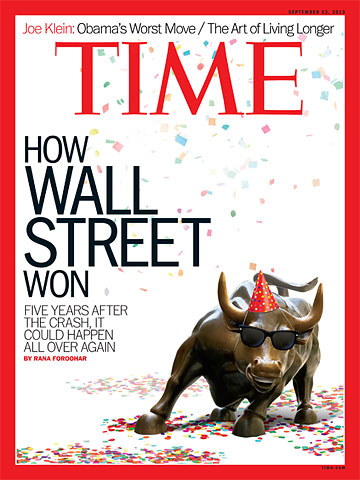
(6 of 6)
We may not get those anytime soon. But there are still some things that we can do to bring finance back in line with the rest of America. For starters, we could devise a better system for conducting the credit ratings of banks, one that doesn't involve credit agencies being paid by the very banks that they rate. (Unbelievably, this is still the case, five years on from the crisis.) We could get rid of the revolving door between Wall Street and Washington by compensating regulators appropriately rather than asking people earning five figures to police those making seven. "We should drastically increase the pay of our senior financial regulators so that they don't want--or need--to go back and forth from Wall Street to the public sector," says INET's Rob Johnson. Indeed, the money you'd likely save in preventing financial blow-ups via better regulation would be worth the expenditure.
We could also hold financiers more personally accountable for their actions. Columbia professor and Nobel laureate Joseph Stiglitz believes, along with a number of other academics, that CEOs of major banks should be legally culpable for bad deals. (Rules from 2002's Sarbanes-Oxley Act require the same for much of the rest of corporate America.) "If we had been able to put some people in prison, many fewer would have wanted to join in the bad behavior the next time around," says Stiglitz.
It's a sad fact that some of the most cynical things that went on in the lead-up to the financial crisis, like banks making derivative bets against their own clients, were in fact perfectly legal. But other actions--including bankers' writing mortgages that they realized would go bad or risk managers' looking the other way during compromising deals--could have been prosecuted more vigorously. Higher abuse penalties and more vigorous prosecution may not make up for the fact that the structure of our banking system still isn't what it should be, five years on from the worst crisis in 70 years. But it would start to change the economics of malfeasance. If the past five years have taught us anything, surely they have showed that small losses can easily result in something much, much bigger.
Due to an editing error, the original version of this article referred to Stanford professor Anat Admati as "he" rather than "she".
